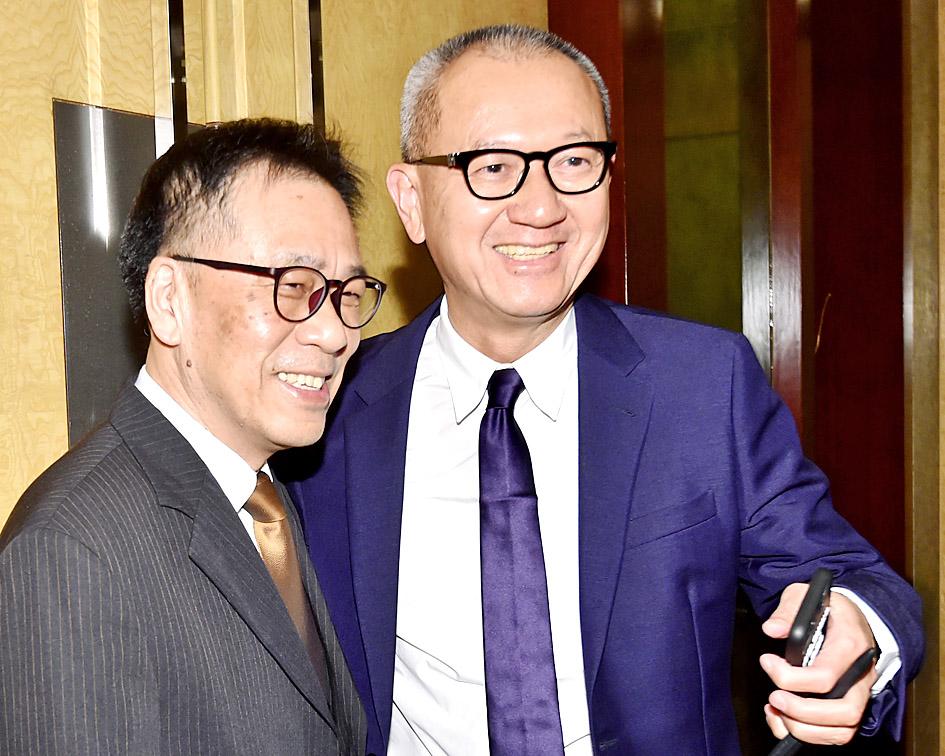Yageo Corp (國巨) on Wednesday issued a positive forecast for business and gross margin prospects as merger-and-acquisition deals bear fruit.
Chairman Pierre Chen (陳泰銘) and CEO David Wang (王淡如) told a virtual investors’ conference that the world’s third-largest supplier of multilayer ceramic capacitors (MLCCs) continued to see strong customer booking this year and expected demand to remain robust in the next one to two years, while it expands capacity worldwide, mainly for specialty products, according to documents obtained by the Taipei Times.
Kemet Corp, which Yageo acquired last year and specializes in MLCCs and other passive components for vehicles, plans to boost capacity at its Mexican factory, which is running at full capacity, Yageo said.

Photo: Tu Chien-jung, Taipei Times
The plant generated more than 90 percent of its revenue from passive automotive components, it said.
Yageo also plans to expand capacity at plants in Kaohsiung and Suzhou, China, it said.
Passive automotive components and those used in industrial devices, medical equipment and data centers are considered specialty products, which deliver higher gross margins due to higher prices and longer supply contracts, the company said.
With the acquisition of Kemet and Pulse Electronics Corp last year, Yageo expects specialty products to make up 82 percent of revenue in 2023, compared with 75 percent this year, while commodity products would make up the rest.
Other passive components, which are used mostly for computers, consumer electronics and communication devices, are vulnerable to price volatility and could adversely affect gross margin, Yageo said.
Due to improvements in its product mix, Yageo expects gross margin to rise further, after climbing to 39.1 percent last quarter from 38 percent in the previous quarter, the company said.
Regarding a strategic alliance with Hon Hai Precision Industry Co (鴻海精密), Yageo said it would secure a bigger order allocation of 50 percent from Hon Hai, compared with 25 percent previously.
The firms last month agreed to form a joint venture, XSemi Corp (國瀚半導體), to focus on chips used in electric vehicles and electronic devices.
Yageo shares rose 2.64 percent to NT$545 yesterday, the highest since April 29.

Greek tourism student Katerina quit within a month of starting work at a five-star hotel in Halkidiki, one of the country’s top destinations, because she said conditions were so dire. Beyond the bad pay, the 22-year-old said that her working and living conditions were “miserable and unacceptable.” Millions holiday in Greece every year, but its vital tourism industry is finding it harder and harder to recruit Greeks to look after them. “I was asked to work in any department of the hotel where there was a need, from service to cleaning,” said Katerina, a tourism and marketing student, who would

i Gasoline and diesel prices at fuel stations are this week to rise NT$0.1 per liter, as tensions in the Middle East pushed crude oil prices higher last week, CPC Corp, Taiwan (台灣中油) and Formosa Petrochemical Corp (台塑石化) said yesterday. International crude oil prices last week rose for the third consecutive week due to an escalating conflict between Israel and Iran, as the market is concerned that the situation in the Middle East might affect crude oil supply, CPC and Formosa said in separate statements. Front-month Brent crude oil futures — the international oil benchmark — rose 3.75 percent to settle at US$77.01

Merida Industry Co (美利達) has seen signs of recovery in the US and European markets this year, as customers are gradually depleting their inventories, the bicycle maker told shareholders yesterday. Given robust growth in new orders at its Taiwanese factory, coupled with its subsidiaries’ improving performance, Merida said it remains confident about the bicycle market’s prospects and expects steady growth in its core business this year. CAUTION ON CHINA However, the company must handle the Chinese market with great caution, as sales of road bikes there have declined significantly, affecting its revenue and profitability, Merida said in a statement, adding that it would

UNCERTAINTIES: The world’s biggest chip packager and tester is closely monitoring the US’ tariff policy before making any capacity adjustments, a company official said ASE Technology Holding Inc (日月光投控), the world’s biggest chip packager and tester, yesterday said it is cautiously evaluating new advanced packaging capacity expansion in the US in response to customers’ requests amid uncertainties about the US’ tariff policy. Compared with its semiconductor peers, ASE has been relatively prudent about building new capacity in the US. However, the company is adjusting its global manufacturing footprint expansion after US President Donald Trump announced “reciprocal” tariffs in April, and new import duties targeting semiconductors and other items that are vital to national security. ASE subsidiary Siliconware Precision Industries Co (SPIL, 矽品精密) is participating in Nvidia